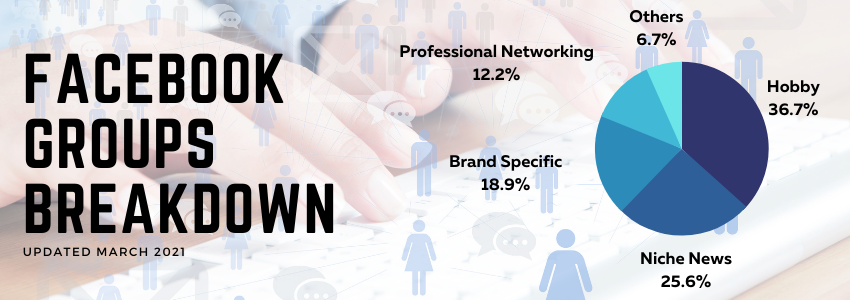Updated: March 27, 2021
How To Build Up Your Reputation In Facebook Groups And Get Noticed
Facebook Groups are here to stay and growing in popularity. The platform now allows you to be a member of up to 300 Groups at once ensuring everyone can find something they’re interested in which Facebook is hoping keeps you on their site longer.
Content marketers and entrepreneurs alike have discovered the long-term value of establishing a Facebook Group.
These Groups of people who share similar interests are an efficient and exciting way to connect with others and build your own private network. A network you can later use to market and grow your business.
Most small business owners and marketers decide they must establish their own group to maintain control. While true, I strongly suggest you first become active and well-regarded members of dozens of similar groups. Learn how they work and learn to find your place your these unique self-contained spheres.
Whether your interest and niche is meal planning, startups, digital marketing, football and anything else you can think of I’m sure there’s at least 30 Groups available. Join them and become an active participant. Build your Facebook Group reputation as a member like anyone else before you announce your own newly-created Group. Do it this way and your Group will grow quickly based on your history and experience in Facebook Groups.

Top Ways To Be Relevant & Grow Your Reputation In Multiple Facebook Groups
With tens of thousands (possibly more) Facebook Groups it’s easy to find yourself drowned out by the noise. A constant flood of irrelevant and annoying posts, comments and new members spamming their affiliate links and upsells.
You need to stand out the right way.
Stay Focused On The Group Topic
The majority of Facebook Groups are niche related. To bloggers this is a great way to connect directly with their preferred readers and expand their audience. To be taken seriously you must stay focused to the point of the Group itself. Don’t jump into a knitting group and complain about your spouse or your kids or talk politics.
Every member joined that specific Group for a reason. You join a knitting group to discuss and share and learn about knitting. Stick to the point and don’t try to expand the Group by mentioning crocheting. That’s another Group entirely, and you’re free to join it.
Know The Rules And Follow Them
While the entire concept of follow the rules should be simple enough for any adult to comprehend, it often proves difficult for many. Each Group has its own rules that dictate how to post, what is allowed and what is forbidden and how to interact with other members effectively.
Rules are there to create a feeling of safety and security to make sure everyone in the Group has the same positive experience.
- Before you share a link – check the Group rules.
- Before you mention your personal life – check the Group rules.
- Before you slap-up a cute photo of your dog in a costume – double-check the rules.
If you violate Group rules you will be kicked out. Facebook has even been known to deactivate entire accounts if a person has been kicked out of multiple Groups for rule violations. Not even Facebook wants to deal with adults who believe they’re above the rules all the time.
Never Put The Group Admin On Blast
You’ve undoubtedly seen comments like “Admin, why did you delete my post?”, they were everyone for years but lately (you may have noticed) you’re seeing less of them. That’s because many Groups are now including this form of adult whining in the rules.
REgardless of whether the group owner is the admin or a team is working on the owner’s behalf, never argue with the decisions they make. Remember, the Admin’s decision is final and no amount of complaining will change it. Such behavior simply makes you look unprofessional and, in some ways, childish.
If you attack the admins, you’re attacking the entire tone of the Group itself. Other Group members with longer tenure than you will take umbrage with your behavior, and eventually you’ll be asked to leave or outright banned.
Don’t Post Links Unless Specifically Allowed
Most Groups don’t allow link sharing but when they, it is almost always on a specific post (clearly stated as such) and oftentimes even on a specified day.
Before you even think about posting a link to any Facebook Group be sure you read over the group’s link-sharing rules and follow them exactly. If you’re unsure, don’t share the link. Remember the long-term goal is to build your reputation on as many Facebook Groups as possible allowing you to harness that power for your own business.
Don’t Do The Obnoxious “Delete If Not Allowed” Tactic
When you join a Facebook Group the other members rightfully expect that you know the rules. The fastest way to lose your reputation, tarnish your image and make a fool of yourself is to be the adult that posts whatever he or she wants with the CYA / disclaimer text “delete if not allowed”.
You may think nothing of it but what you’re saying to the other group members is that you can’t be bothered to read the rules. Or even worse, that you don’t think the rules apply to you as well.
Answer Questions And Be Helpful But No One Likes A Know-It-All
99% of Facebook Groups are safe places where people feel comfortable asking questions relating to the purpose of the group. Questions, answers and expanding one’s knowledge is the original reason anyone joins a group in the first place. Embrace this truth and become part of the solution.
If you spot a question you can answer, answer it. Keep your answer brief but helpful. Informative but never condescending and don’t flash your fancy credentials around (no matter how hard-earned they may be).
This takes times but if you answer enough questions without arrogance people take notice. It gets around that you have the knowledge and people will start to tag you directly in questions other people ask.
Ask Questions But Do Not Crowdsource
You may be the world’s foremost expert on the Group’s niche in which case, you’ll build your reputation, personal brand and business quickly but not if you come across as obnoxious. People love expertise but no one likes dealing with oversized adult egos. Arrogant people tend to talk down to others and make the rest of us feel inferior. No one likes to feel inferior.
When you’re taking part in a Facebook Group you have to give as much as you take. You may well have all the answers but you still need to get in there, take part and ask thoughtful questions.
By asking questions you’re showing that you’re not a know-it-all and just like every other human, you too have concerns or uncertainties. It humanizes you and builds up your personal brand.
This is a profound and quick method to show the community your personality.
Most importantly if you can’t come up with any questions to ask, never debase yourself and our other members by resorting to crowdsourcing.
If you have questions about your website or need to know what color palette is most appealing to buyers, ask elsewhere. Facebook Groups are not the place for that.
If In Doubt, PM The Admin(s)
Thanks to recent changes to the Groups structure it’s now easy to private message the group admin or owner directly. If you have a question that only the group admin can answer, do not post it to the group itself. A quick private message to the Group page will allow the admin to respond directly.
You may discover a few groups that don’t like members messaging the admins directly. While not unheard of these such groups tend to be very large with multiple admins that makes PMs a logistical nightmare for them.
Questions about group policies, rules, special codes, link sharing day or open posts should go directly and privately to the group admin. Under no circumstances should you be crowdsourcing for answers.
So what’s the big takeaway on Facebook Groups?
Groups aren’t going anywhere, and they shouldn’t – everyone wants a place to belong and a safe haven to discuss their interests. It’s nice to part of a community where you can express yourself without getting called names. And business owners, marketers and bloggers will find inclusion among their buyers, but please remember to behave accordingly. It’s about building your personal brand, not selling.
Joining a group isn’t a quick fix for your website traffic woes. It takes time to build up your engagement and reputation in a new group. You need to be noticed and that will require consistency on your part. Don’t break the rules, get involved and be helpful. Do that and watch your reputation grow each week.



Did you know there’s a way to dramatically decrease your Facebook Ads cost by tapping into the algorithm and giving it exactly what it wants? And we’ve proven it for months. In fact, we’ve used this exact same method to lower Facebook costs by 60% on average. Keep Learning >

Hosting a group giveaway is a guaranteed way to multiply the number of subscribers on your list in a relatively short time frame. All that’s required is some proper planning, organization and the right tools. I’m going to walk you through it. Keep Learning >



